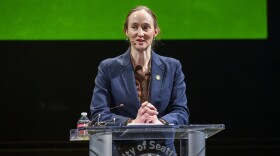Earlier this week, the budget writers in the state House and Senate rolled out their plans for the next two years.
The focus for lawmakers from now until they're scheduled to adjourn at the end of April is to get a budget deal, and get the governor's signature in time for the start of the new fiscal year.
Along with some cuts, new taxes are part of the equation for Democrats in charge of the process, but they may be at odds with Gov. Bob Ferguson, who has said taxes should be a last resort to close what looks to be a $10 to $15 billion deficit.
Olympia correspondent Jeanie Lindsay joined KNKX Morning Edition host Kirsten Kendrick to talk about the ongoing budget negotiations.
Click “Listen” above to hear their conversation, or find the transcript below.
Transcript
Note: This transcript is provided for reference only and may contain typos. Please confirm accuracy before quoting.
KNKX Morning Edition host Kirsten Kendrick: Jeanie, set the stage for us. What do these budget proposals look like?
Olympia Correspondent Jeanie Lindsay: Yeah, like you said, I mean, it's a mix of tax increases and cuts — with a bit of new spending on key areas — but the bulk of the spending increases in these budgets, really seem to be about maintaining existing programs.
So both the House and Senate plans include broad cuts to state agencies that Governor Ferguson has asked for, efficiencies in government type stuff, in addition to just reductions in spending overall. Otherwise, the cuts would come from delays or elimination of programs and services, in childcare and early learning, higher education, and health.
Kendrick: And of course these negotiations are happening at a tumultuous time for federal funding. What expectations for federal budget cuts are the Democrats building in?
Lindsay: The Senate proposal is considering essentially draining the state's reserves for one year in their budget proposal to cover, sort of, the squeeziest year of state spending.
The House doesn't do that, and specifically cited concerns about federal tumultuous funding cuts, about why they wanted to maintain the cushion of those reserves. But ultimately they've also said that there's really no way to plan for drastic federal cuts.
I mean, if the federal government decides to gut Medicaid, that's billions and billions of dollars. The state's reserves right now is like $1.25 billion.
Kendrick: And you have the state treasurer, kind of, waving that caution flag saying "hey!"
Lindsay: Oh yeah, absolutely. The treasurer is saying don't drain the reserves. So, it's certainly going to be an interesting piece of the debate and the negotiations.
Kendrick: There are also new taxes in these budget plans. Who's likely to be affected by what's being proposed?
Lindsay: Democrats say that they're trying to focus their taxes on the wealthiest people and companies. So, the specifics of the proposals from the Senate and the House, they each came out with their own sort of slate of tax ideas.
There are some differences in sort of how they would work, in the specific numbers and stuff. But philosophically speaking, they're talking about trying to tax the wealthy people and companies more and trying to offer some sort of relief for changes for everybody.
The Senate is proposing a sales tax cut. And the Democrats in the House are — through this property tax bill that they're talking about — making sure that there are exemptions to those changes for seniors and people with disabilities. But there is agreement on just the focus of tax increases, trying to be more targeted at wealthier people and companies.
Kendrick: Jeanie, what has this budget process showed so far about the vibe between this new governor and the Legislature?
Lindsay: Well, the Legislature is doing what the Legislature wants, and Governor Bob Ferguson has laid out a wish list, he's voiced some of his priorities. He's called taxes a quote-unquote “last resort.” And he's also asked for specific funding things that we haven't really seen funded in these budget proposals yet.
So one example is, he's said he won't sign a budget that does not include more money for local jurisdictions to hire police. The Senate budget doesn't have anything like that, and the House budget includes $25 million for hiring local cops. So it's certainly going to be interesting to see how they negotiate these different pieces.
It could be a way that Democrats are trying to get him more on board with taxes because so far he's been really skeptical about that. But it definitely shows that the governor has his wish list and he has his priorities, and legislative Democrats, are also Democrats, but they have their own priorities too.
Kendrick: All right, we'll see what happens. Jeanie, thanks so much. We'll talk again soon.
Lindsay: Sure will. Thanks.
Kendrick: That's Olympia correspondent Jeanie Lindsay.








